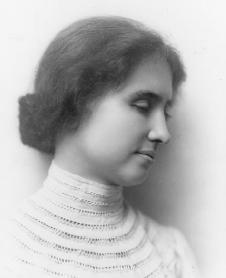NEVER GIVEUP....STRIVE TO REACH THE PURPOSE OF LIFE

Though both blind and deaf, American lecturer and author Helen Keller (1880–1968) traveled the world over, fighting for improvement in the education and life of the physically handicapped.
Helen becomes deaf and blind:
Helen Adams Keller was born in Tuscumbia, Alabama, on June 27, 1880. Her parents were Captain Arthur H. Keller and Katherine Adams Keller. Her father was a veteran of the confederate army (army that fought to separate from the United States during the Civil War, which lasted from 1861 to 1865). He also was the editor of the local newspaper, the North Alabamian. Helen was born a normal child. She started speaking when she was six months old. By the time she was a year old, she was able to communicate with her parents and she had also learned to walk. When Helen was eighteen months old an illness developed that the doctor described as brain congestion. She ran a high fever for many days, and then the fever was gone. Helen was left deaf and blind from the illness. Helen became a very wild, unruly child. She would scream and kick when she was angry and giggle and laugh when happy. She developed many of her own signals to communicate her needs with her parents.
Her early learning:
When Helen was six, her mother contacted Dr. Alexander Graham Bell (1847–1922), whom she had heard was working on devices to help the deaf. Bell met with Helen and her parents and suggested that they contact the Perkins Institute for the Blind in Boston, Massachusetts. In March 1887 Anne Sullivan (1866–1936), a teacher at the institute, came to serve as Helen's teacher. Anne was twenty-one years old and had sight limitations of her own. One month after her arrival, Sullivan had taught Keller the word "water." She did this by using her fingers to spell letters into Helen's hand. From this she understood that objects had names, and that her teacher spelled these names into her hand. This unlocked a whole new world of learning for Helen.
Anne Sullivan was with Helen day and night, constantly spelling into her hand the words and ideas of things going on around them. Helen was a quick learner. In only three years she learned the manual alphabet (sign language), the Braille alphabet (an alphabet created by Louis Braille [1809–1852] for the blind that relies on raised dots to communicate), and she could read and write.
Schools and education:
Anne Sullivan was with Helen day and night, constantly spelling into her hand the words and ideas of things going on around them. Helen was a quick learner. In only three years she learned the manual alphabet (sign language), the Braille alphabet (an alphabet created by Louis Braille [1809–1852] for the blind that relies on raised dots to communicate), and she could read and write.
Schools and education:
Helen wanted to learn to speak, and in 1890 she began taking speech classes at the Horace Mann School for the Deaf in Boston. She worked diligently at learning to speak. After twenty-five years of hard work and practice, Helen was able to speak in a voice that others could understand.
From 1894 to 1896 Helen attended the Wright-Humason School for the Deaf. Here she continued to work on improving her communication, as well as her math, French, German, and geography. In this way Helen prepared herself for college and went on to Cambridge School for Young Ladies. Anne Sullivan attended every class with Helen and interpreted the lectures and books for her, as they were not in Braille. By the time she was sixteen, Keller had passed the admissions examinations for Radcliffe College; in 1904 she graduated cum laude (with honors). This was all done with the assistance of Anne Sullivan interpreting the lectures and texts.
Devotes life to helping others:
As a young woman Keller became determined to learn about the world and to improve the lives of others. With insight, energy, and deep devotion to humanity, she lectured throughout the world, worked to forward her ideas in Congress, and wrote thousands of letters asking for contributions to finance efforts to improve the welfare of the blind. She visited hospitals and helped blind soldiers. She taught the blind to be courageous and to make their lives rich, productive, and beautiful for others and for themselves.
Keller associated with some of the greatest people of her time, including Alexander Graham Bell, Mark Twain (1835–1910), Andrew Carnegie (1835–1919), John D. Rockefeller Sr. (1839–1937), and Presidents Grover Cleveland (1838–1908), Calvin Coolidge (1872–1933), and Woodrow Wilson (1856–1924). She authored such books as Helen Keller's Journal, Out of the Dark, Midstream: My Later Life, My Religion, The Song of the Stone Wall, The World I Live In, and The Story of My Life.
Sullivan served as Keller's counselor and companion. When Keller died in 1968 her name had become a worldwide symbol of what the human spirit can accomplish despite severe physical limitations.

No comments:
Post a Comment